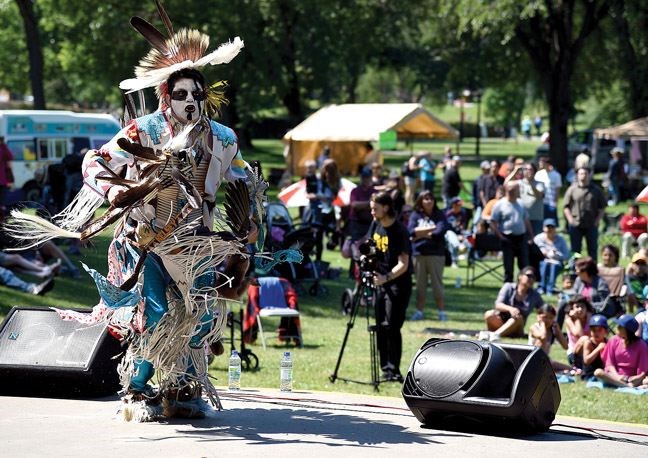Reconciliation can take form in so many simple gestures, like so many grains of sand trickling through an hourglass.
"Like the sands of time," said visiting Chief Robert Joseph at the official renaming of Lheidli T'enneh Memorial Park.
With his words, Joseph painted an image of slow progress for the audience at Prince George's National Aboriginal Day on Sunday.
"We now have an opportunity to reshape our narrative, our story, our collective story from the colonial times to a new way forward unlike anything we've ever seen us before that allows all of our children to have the same opportunities to allow us to walk together in dignity and to walk in a society that is gentle and kind, equal, trusting," said Joseph, who leads Reconciliation Canada.
Raising the Lheidli T'enneh flag at city hall, the renaming of the former Fort George Park and Sunday's large gathering each represent "significant events in your community, in this city and in our province and country," Joseph said.
"It signals to me and to others that we are prepared to look at the future together. What a profound moment this is for us."
For Dominic Frederick this year proved a marked difference to recent, darker anniversaries.
"Last year it wasn't a celebration for Lheidli T'enneh because it was 100 years when the village was torched and they moved our village up the river," said the Lheidli T'enneh chief in reference to the 1913 forced removal of the aboriginal community.
Frederick and others acknowledged the controversy surrounding the name change of the now-former Fort George Park.
"It's not being ignorant," he said. "(People) just don't understand. They don't know what happened to Lheidli T'enneh."
The province announced Sunday it would give the City of Prince George $25,000 to help make that history more visible in the form of a memorial at the park, which is also a burial ground.
"It's a history that we're not proud of, but it is our history," said John Rustad, Minister of Aboriginal Relations and Reconciliation at the announcement.
"In recognizing the Lheidli T'enneh, I think it's an important component because we need to understand our history. We need to understand how we got to where we are today if we want to be able to build a future."
Renaming a space may seem simple said Carrier Sekani Tribal Chief Terry Teegee, but it is meaningful.
"I think it's a huge gesture because it's a willingness to negotiate," he said. "We're seeing these little things throughout the country."
Teegee echoed the words of Murry Krause, the Prince George councillor who made the motion to rename the park.
"It's reclaiming, not renaming," said Krause in his speech.
The reality of lost names is true for land across the province and country, said Teegee.
"They already had names before the settlers came here," said Teegee. "That needs to be said."
Kelly O'Neil, vice president of the Metis BC Nation's Prince George group, said he believes the suddenness of the decision is to blame for negativity around the name change.
"I think that's what's generating the backlash," he said, adding he hoped the reaction would turn more positive.
When he came to Prince George in the 1980s, he confronted quite a bit of intolerance. That has slowly changed.
"I won't say acceptance is where it should be but event like today would not have taken place in 1980s," said O'Neil of the turnout for aboriginal day in Prince George.
For O'Neil and Raymond Hourie, president of the group, it was important that Sunday's speeches also mentioned relationship building with Metis, which number some 11,000 in the province, they said.
Dressed in a bright blue dress adorned with red maple leaves and white feathers, Lori Henry said rediscovering traditional Cree regalia is a learning process.
In her mother's lifetime, that dress would have been forbidden, as were potlatches until 1951.
Aboriginal Day represents healing, she said, "because we can wear our regalia and be proud of who we are."
And she said it's okay that her dress isn't perfect, and learning her culture is an ongoing process.
"It's a start," Henry said.
The renaming of Lheidli T'enneh Memorial Park is one such start, said Krause in his speech, adding he hopes it is the first of many initiatives.
It isn't about blaming but about an acknowledgement, he said.
"Controversy and even conflict is not a bad thing as long as we learn from it and take the right path," said Krause.
"There are those who have said they can't be responsible for what has happened in the past but we sure can take responsibility for what happens here and now and today and in the future."



